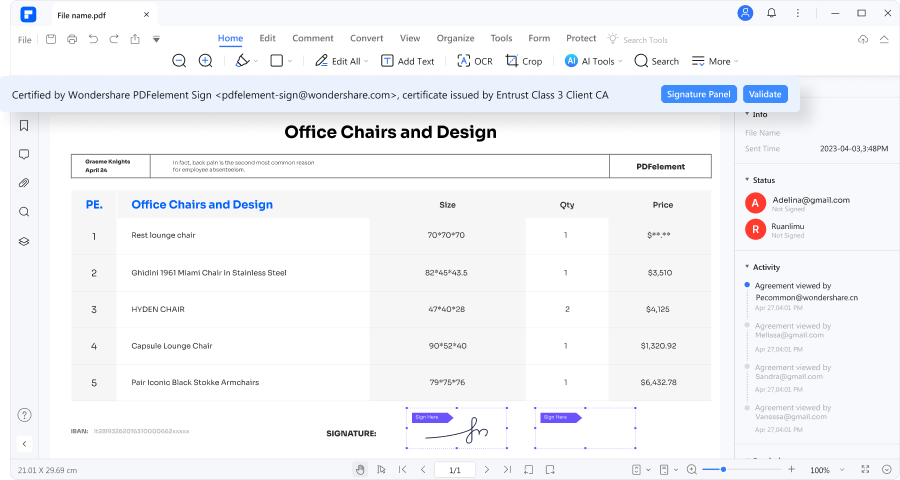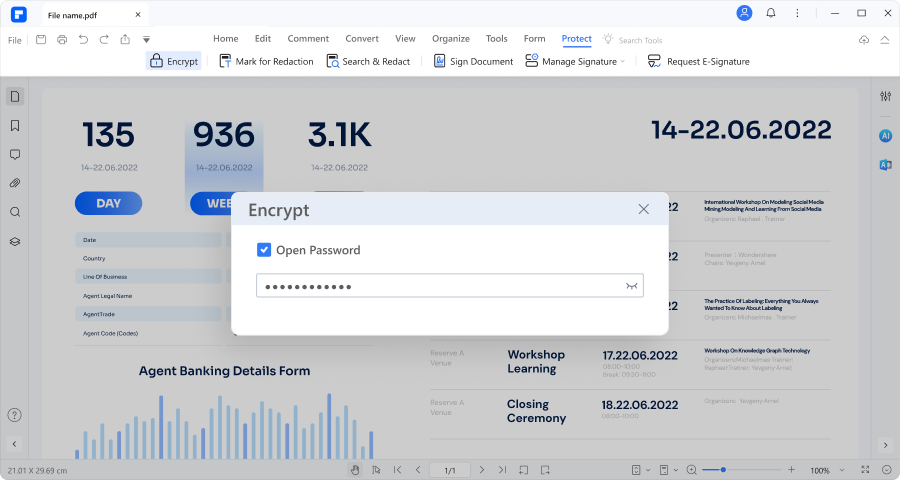Notarization is a process where a notary public verifies the signer's identity. This step confirms that the signatures on documents are genuine. This is crucial in law. It helps to keep records trustworthy. Notarization also stops fraud. It makes sure everyone knows the documents are real and valid.
Many often ask, "What documents need notarized?" Common examples include wills, property deeds, and contracts. These require a notary to ensure they are legally binding. Knowing which documents need this level of verification is important. It helps protect the interests of all parties involved.
In this article
Part 1. What is Notarization?

Notarization is key in ensuring that documents are true and their signatures are real. This process involves a notary public, who does the state approve a person to act as an impartial witness. The notary checks the identity of people signing the documents. This helps prevent fraud by confirming that signers are who they say they are and understand what they are signing.
The notary public also ensures that signers enter into agreements freely and willingly. This is crucial for the documents to be valid under law.
Understanding the differences between notarization, certification, and legalization is important.
- Notarization, as described, involves a notary verifying identity and willingness.
- Certification is when an authority verifies that a copy of a document is true to its original.
- Legalization is a step further, where government authorities validate a document's authenticity, usually for use in another country.
Each process strengthens the trust and legal standing of documents in different ways.
Part 2. What Kind of Documents Need to be Notarized?
Many documents need to be notarized to be considered legal and valid. Here are some common types:
- Legal Documents. These include wills, trusts, and powers of attorney. Wills outlines what should happen to a person's assets after they die. Trusts manage assets on behalf of others. Powers of attorney give someone the right to make decisions for another person.
- Property Deeds. These transfer property ownership from one person to another. Notarization ensures that the transfer is recognized legally.
- Contracts and Agreements. These documents are agreements between two or more parties. Notarization confirms that all parties signed the agreement willingly and understand it.
- Affidavits and Declarations. These are statements made under oath. They are often used in court cases. Notarizing these documents confirms that the statements are made truthfully.
In some places, the rules about which documents need to be notarized can vary. For example, some states might require notarization for certain contracts, while others do not. It's a good idea to check local laws to see what needs notarization in your area.
What Documents Cannot be Notarized?
Some documents cannot be notarized. It's important to know these to avoid confusion. Here are the main types:
- Incomplete Documents. A document must be complete to be notarized. A notary cannot sign off if missing parts or blank spaces are left. Everything must be filled in to ensure the document is correct and full.
- Documents without Clear Signers. If a document does not clearly show who is involved or who needs to sign, it cannot be notarized. The identity of all parties must be clear for the notarization to be valid.
Some common misconceptions include the idea that any document can be notarized. This is not true. For example, personal letters or emails typically do not qualify for notarization. Also, some believe that notarization makes any document legally binding. However, notarization only verifies the signers' identity and understanding of the document. It does not confirm the document's content's legality or truthfulness.
Understanding what cannot be notarized helps ensure the notarization process is used correctly and effectively.
Part 3. How Wondershare PDFelement Facilitates Document Notarization
Wondershare PDFelement - PDF Editor Wondershare PDFelement Wondershare PDFelement is a tool that can greatly help prepare documents for notarization. Here's how its features are useful in this process:
PDF Conversion: PDFelement allows users to convert documents from and to different formats. For example, you can turn Word documents or images into PDFs or vice versa. This is helpful because notarized documents often need to be in a universally accepted format like PDF.

E-signature Capabilities: This feature lets you add digital signatures to documents. These signatures have legal standing, similar to handwritten ones. This is crucial for documents that need to be signed before notarization.

Document Merging and Organizing: You might need several documents in one packet when preparing for notarization. PDFelement lets you merge multiple documents into a single PDF. You can also organize the pages in the order they need to be.

Using Templates: PDFelement offers templates for common notarizable documents such as contracts or affidavits. This makes starting with a professionally designed format easy and ensures all necessary parts are included.

Enhancing Document Security: It's important to secure documents before sending them for notarization. PDFelement can compress and password-protect PDFs. Compression makes the document easier to handle and send, while password protection keeps the information safe.

Imagine you need to prepare a property deed for notarization. First, convert the original document into a PDF using PDFelement. Then, add your e-signature. Next, merge this document with other required documents like proof of identity. Finally, secure the packet with a password and send it securely to the notary.
Using PDFelement streamlines the preparation of documents for notarization, making the process more efficient and secure.
How to Get Documents Notarized
Getting a document notarized is a straightforward process. Here’s a step-by-step guide to help you:
Finding a Notary
Start by locating a notary public. You can find one at banks, law offices, or government buildings. Some shipping and office supply stores also offer notary services.
Preparing the Document
Make sure your document is complete with no blank sections. Understand everything in the document before you sign it. This is important because you confirm that the information is correct and agree to it.
What to Bring
Always bring a valid photo ID such as a driver's license or passport. This is needed to verify your identity. If your document requires witnesses, bring them along. They will need to watch you sign the document.
The Notarization Process
During notarization, the notary will check your ID and make sure you understand the document and are willing to sign it. Then, you’ll sign the document in front of the notary. The notary will then stamp or seal the document, making it officially notarized.
By following these steps, you can ensure your document is properly notarized and meets all legal requirements.
Part 4. Why Do Documents Need to be Notarized?
Documents need to be notarized for several important reasons:
- Legal Verification: Notarization verifies that the signatures on documents are genuine. This is crucial in making the documents legally valid. For example, a notarized document can be used as reliable evidence in court because its authenticity is confirmed.
- Fraud Prevention: Notarization helps prevent fraud. By verifying the identity of the people signing, a notary ensures that no one is forging signatures or misrepresenting themselves. This is essential in protecting all parties involved.
- International Use: Notarization is often required for documents used across country borders. It assures another country that the document is legitimate and complies with international standards.
Transferring property ownership without a notarized deed in real estate could lead to disputes or fraud. In legal affairs, powers of attorney must be notarized to ensure that the person given authority to act on behalf of another is doing so with proper authorization.
These scenarios show why notarization is a formality and a vital step in ensuring legal and personal security.
Conclusion
Notarization is key for making documents legally solid and preventing fraud. It involves verifying signatures and ensuring willing participation. Wondershare PDFelement simplifies this process. It lets you convert, sign, and organize documents easily. This tool also ensures that documents are secure before notarization. By using PDFelement, preparing for notarization becomes straightforward and efficient, saving time and effort.

 G2 Rating: 4.5/5 |
G2 Rating: 4.5/5 |  100% Secure
100% Secure



